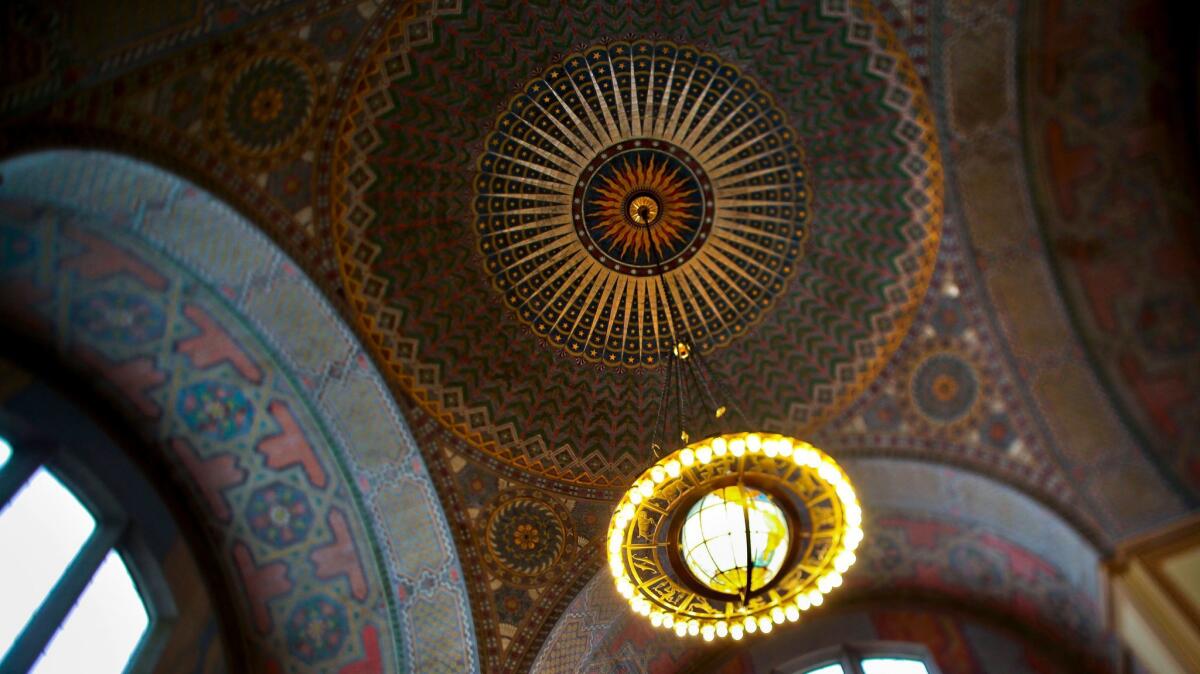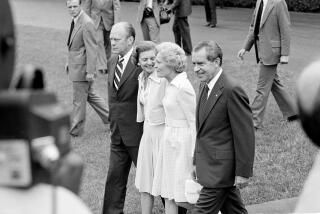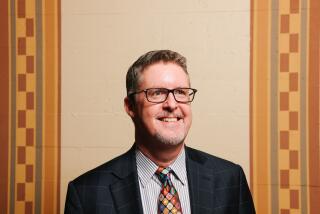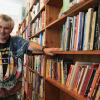Column: How to weather the Trump administration: Head to the library

Even now, in this riven country, after this whole entropically hideous year, most Americans still agree on at least one institution. Mercifully, it’s the one that may just save us: the public library.
Hear me out. In small towns and large, in red states and blue, libraries poll better across the political spectrum than any public trust this side of the fire department. In districts where millage increases don’t require a two-thirds vote (and frequently where they do, as in California) modest library bonds usually win.
If, as he claims, our new president really wants to invest in infrastructure, then America will need to build more than just roads and bridges. If Donald Trump is as smart as he insists he is, then he can prove it by strengthening our intellectual infrastructure. That means libraries — and he can start with one audacious symbolic act.
I’ve looked at libraries from at least four sides now, as a full-time book critic, a federal grantmaker (in a red administration!), a nonprofit lending librarian in an immigrant, working-class neighborhood, and on the faculty at UCLA. While midwifing the nonpartisan NEA’s one-city-one-book program, The Big Read, I visited more than 100 public libraries in 40-some states, with a fat deck of library cards in my desk now to prove it.
If all these experiences have taught me anything, it’s that librarians may be the only first responders holding the line between America and a raging national pandemic of absolutism. More desperately than ever, we need our libraries now, and all three of their traditional pillars: 1) education, 2) good reading and 3) the convivial refuge of a place apart. In other words, libraries may be the last coal we have left to blow on.
All the research out there — Census data, NEA reports, the Pew Research Center’s work on libraries and reading in low-income neighborhoods — all of it points toward reading enjoyment as the surest predictor of health, wealth and good citizenship. Readers volunteer more, vote more, even exercise more. And a recent Yale study categorically shows what most of us have long suspected: Readers live longer than nonreaders.
Education-wise, perhaps alone among public institutions, libraries can become the kink in the school-to-prison pipeline. Rightly or not, U.S. education is generally thought to be in a bad way and may take at least a generation to fix. Americans worry about it so much that many opt out of public education in favor of private, home-based and other parochial schools. Between the charter movement and the teacher’s unions, nobody’s solving this one anytime soon.
The crisis goes double for higher education. For every distinguished institution of higher learning like mine, there’s a lobbyist-fortified diploma mill, only too happy to take the money of vets and the unemployed for little or nothing in return. Where will their tens of thousands of fleeced alumni turn now?
Many of them will turn to public libraries, where they probably should’ve gone in the first place. When schools fall short, libraries may just have it in them to pick up some of the slack. The only question is, will they get the resources they need to do it?
Book-wise, the superfunding of libraries belongs near the top of any government’s to-do list because the better our public libraries, the better the poets, editors and novelists we’ll get a generation later.
This may seem a boutique priority, but between the sweaty thumb and forefinger of my right hand I once held the teenage library card of F. Scott Fitzgerald. Ever since, I’ve believed that the strongest advertisement for libraries would be blowups of the signed elementary-school local library cards of great Americans — yes, stronger even than posters of athletes and actors with paperback copies of “The Scarlet Letter” held carefully right-side-up. If you want better American literature tomorrow, don’t stiff libraries today.
Finally, refuge-wise, libraries are the ultimate “third place,” the urban sociologist Ray Oldenburg’s “sanctuaries beyond the realms of home and work.” Nowadays, what with bring-your-dog-to-work days and bring-your-work-home jobs, home and work are becoming almost interchangeable. We need a third place more than ever, and libraries — with quiet courtyards and alcoves, or provocative public meetings and programs — increasingly offer that very place.
The resurgent popularity of libraries shouldn’t surprise anybody. Americans, as a rule, tend to think we’re right. We may not have a monopoly on wisdom but, at the very least, we’re its franchisees. If only members of the other party were wiser, goes the thinking, they’d think, and vote, like we do. Libraries are in the wisdom business, so naturally we favor them — at least for the other guy. They are, or can be, politically bulletproof.
Directly or indirectly, the only arguments against libraries originate with futurists trying to sell us the same wisdom that libraries provide for free. That, or with politicians trying to “drain the swamp” of government funding. If your reelection depended on voter ignorance, you’d want to starve libraries too.
Libraries aren’t perfect, but they’re evolving. Things always get delicate when they redefine themselves as “more than just books” because to some of us “just books” will always sound like “just oxygen.” But, in addition to their sacred role as an ark for endangered book culture, libraries already offer most of the services that society can’t or won’t otherwise provide. They’re career counselors, homeless shelters and Internet cafes, stopgap solutions to way too many of society’s problems.
If government doesn’t want to confront these ills, we should at least stand ready to help the one institution that’s addressing them already — and the new president could demonstrate that willingness by moving his inauguration.
Librarians may be the only first responders holding the line between America and a raging national pandemic of absolutism.
Deciding where to take the oath of office probably seems like, you should pardon the expression, a no-brainer. Haven’t chief justices have been swearing in presidents-elect on the National Mall since the Capitol was built in the year 1800?
Actually, no. The first president to take the oath on the western front of the Capitol, so help me God, was Ronald Reagan in 1981. So it’s hardly a law. Barely a tradition. The president-elect could raise his right hand at the new Trump Hotel (downstairs from my old NEA office) if he felt like it. But if our new chief executive really wants to make a trans-partisan break with precedent, then the front door of Congress, perhaps the least respected institution in the country, might not be the best place to start.
Luckily, the absolute best place is right across the street: our great secular national cathedral, the Library of Congress. And Thomas Jefferson’s great gift to the country should stand in for every public library in the land — palatial or puny, hewn from marble or shoehorned into a mini-mall, with stone lions out front or mice in the stacks.
Fortuitously, for the first time since its founding in 1806, Congress has just confirmed a public librarian, Carla Hayden of Baltimore’s Enoch Pratt Free Library, as Librarian of Congress. Somebody who’s actually worked a reference desk and staffed a story hour, Hayden can set a new national agenda for libraries and reading in a country that critically needs one.
For now, come inauguration day, she could do a lot worse than to roll out the red carpet and welcome the new president to her front steps. Nothing makes a good impression like inviting the new boss over to your office for a chat.
All this may explain why I believe our next president should deliver the inaugural address from nowhere but the steps of our national library. And then, turning his back on the cameras, the polls, and even the electorate, he should step inside.
Former literature director of the NEA, David Kipen is the founder of the Boyle Heights-based nonprofit lending library Libros Schmibros.
ALSO
Authors react to Trump win with optimism and despair
Founders of Reductress bring new book to L.A.
More to Read
Sign up for our Book Club newsletter
Get the latest news, events and more from the Los Angeles Times Book Club, and help us get L.A. reading and talking.
You may occasionally receive promotional content from the Los Angeles Times.







